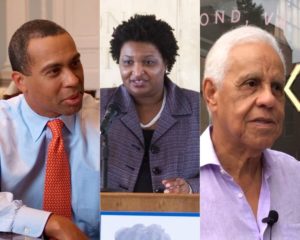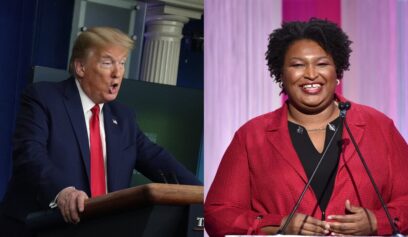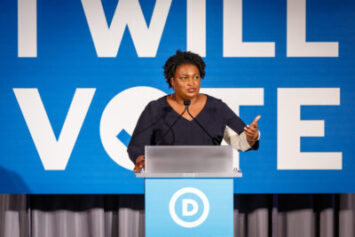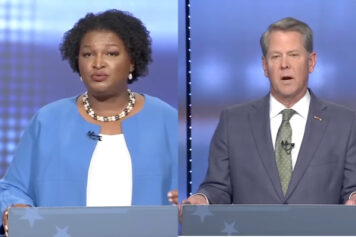
Deval Patrick, Stacy Abrams and Douglas Wilder (Wikimedia Commons/YouTube)
An alarming event took place in Louisiana 145 years ago. Though the former Confederate state was on the losing side of the Civil War a few years prior, little could have prepared the state’s plantation owners, white terror groups and elected officials for the infamous day of Dec. 9, 1872, when a Black man was sworn into the most powerful position in the state. Upon the suspension of the scandal-ridden Henry Clay Warmouth from office 35 days before the end of his term, Lt. Gov. Pinckney Benton Stewart Pinchback became acting governor of Louisiana and the first Black governor of any American state.
One month later, Pinchback’s brief reign ended as he served out the remainder of the term. What also ended was any real chance of his feat being replicated, as a concerted campaign of murder and intimidation by white terror groups — one supported by local officials and business leaders — thwarted the Reconstruction-era gains of the country’s newest citizens and shrank Black voter registration by the tens of thousands.
It would take 117 years for another Black man to become governor of an American state with the 1990 election of Douglas Wilder in Virginia. And today, almost a century and a half since Pinchback’s pioneering role and less than a year removed from the alleged “postracial” presidency of Barack Obama, only three African-Americans, including Wilder, have helmed a state.
Of the nation’s four Black governors — Pinchback, Wilder, New York’s David Paterson and Deval Patrick of Massachusetts — only two were voted in, as Paterson assumed his role upon the resignation of New York’s Eliot Spitzer. With only two African-Americans elected governor in the country’s history, it begs two obvious questions: Given the substantial representation of elected Black state officials across the country, why has it been so hard to claim the governor’s seat? And will it ever happen again?
“It’s tough for Black statewide candidates, particularly in states with large swaths of rural and suburban white voters who reside in politically red areas,” offers Charles Ellison, a veteran political strategist and principal at B|E Strategy. Ellison hosts the public affairs program “Reality Check” on Philadelphia’s WURD radio. “It’s also a challenge for Black gubernatorial candidates playing the balancing act between Black voter expectations and needs, and building a multi-cultural coalition.” Particularly, given “most Black gubernatorial candidates come from urban or metropolitan centers.”
Implicit in Ellison’s response is the traditional need for African-American candidates to establish an identity in liberal, majority-Black districts while courting a white, less-liberal base by incorporating conservative tendencies or associations (see Cory Booker). However, if they gain traction with this larger audience and seek statewide or higher office, they commonly have to distance themselves from their Black-liberal foundation to forge a successful political identity that “transcends race.”
Still, Ellison points to how some can suffer from not developing such a foundation in the first place. “Black statewide candidates sometimes expect that just because they’re Black, Black voters will notice,” says the strategist, noting, “that’s a key mistake. Lt. Gov. Anthony Brown in Maryland learned that the hard way in his 2014 bid.”
But wait, there’s more. Along with “Black gubernatorial candidates not having the kind of fundraising and resource infrastructure they need to compete,” Ellison suggests the Democratic party commonly throws less of a party for its African-American statewide office seekers. “State Democratic parties don’t seem all that inclined to either groom, support or encourage Black statewide nominees, even in states with large concentrations of Black voters and a high coalition-building potential that would make a Black gubernatorial candidate much more competitive.”
The competition was less than fair from the start. Pinchback’s 1872 victory in Louisiana was the result of a series of extraordinary events, the likes our country had never seen. The mixed son of a plantation owner and a freed African woman, Pinchback served the Union as a commissioned officer in Louisiana during the Civil War before resigning due to the racism he experienced within army ranks. During Reconstruction, he settled in New Orleans, began a political career as a Republican and was elected to the Louisiana State Senate by the state’s sizable representation of new Black citizens. Incredibly, during this same period, Pinchback also was elected to the U.S. Senate and the U.S. House of Representatives but was never seated, as his white colleagues conspired to falsely accuse him of election fraud and ultimately gave his seats to his white opponents.
Back in the Louisiana State Senate — where, in 1871, 42 members of the House of Representatives and seven Senators were of African descent — Pinchback was elected lieutenant governor in December, upon the death of the previous one, by Black and white colleagues who wished to keep Democrats from claiming Louisiana’s second-highest political office. A year later, a series of scandals and controversies would bring about the impeachment and suspension of Warmouth, enabling Pinchback to briefly govern for the remainder of the term.
Well over a century later, Wilder would claim Virginia in a narrow 1990 victory, prompting a recount which reaffirmed his election. The 21st century brought about the Nov. 7, 2006, election of Deval Patrick as governor of Massachusetts and, on March 17, 2008, David Paterson rose from lieutenant governor to governor of New York upon Eliot Spitzer’s resignation in the wake of a prostitution scandal. While Patrick was re-elected to a second term in 2010, he is the last African-American to have served as governor.
Here in Georgia, House minority leader Stacey Abrams is currently pushing to add her name to this select list by becoming America’s fifth Black governor. Though it will be a daunting challenge in a traditionally red state, Abrams is used to being a pioneer as she was the first woman to lead either party in the Georgia General Assembly and the first African-American to lead the Georgia House of Representatives. Given the state’s shifting demographics, a growing Trump backlash and her increasing and amply financed Democratic power base, Abrams has a real chance in 2018 of becoming the nation’s first African-American woman to lead a state.
Abrams is one of a number of Black candidates across the country who’ve either committed to or are flirting with a gubernatorial run in 2018. Yet, it’s still too early to tell if African-American candidates can win going forward in an increasingly polarized country that has only elected two Black governors in its entire history.
“I believe we will,” says Ellison, noting he is “not sure about 2018, given the polarized racial and political environment.
“But it will happen again, for sure,” Ellison insists. “There’s just too much talent out there.”


